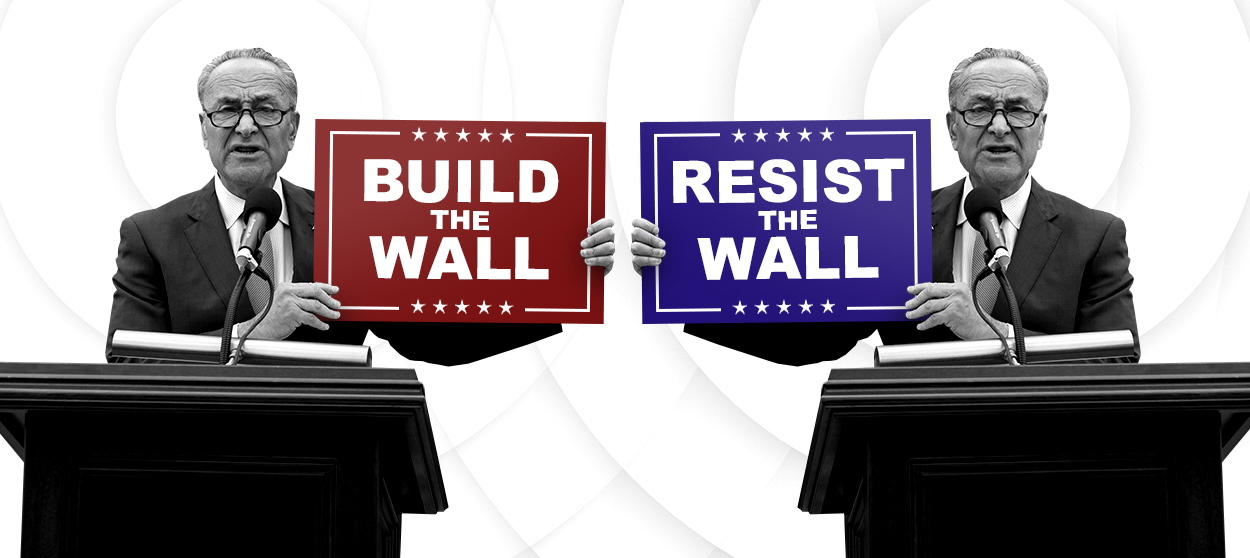How Trump is changing the Democrats
Much has been written on how the Republican Party has changed its views in the Trump era. But the Democratic Party has also gone through an evolution.


A free daily email with the biggest news stories of the day – and the best features from TheWeek.com
You are now subscribed
Your newsletter sign-up was successful
Media outlets have focused on how the Republican Party has changed its views in the Trump era. But the Democratic Party has also gone through an evolution.
With President Trump in the White House, the Democrats have become devoted to blind resistance, flipping on issues they once advocated for simply because he shares their beliefs. "If Trump supports something, then we hate it" has become the governing principle of much of the party's rank-and-file.
Take Trump's signature issue of border security. Building a barrier along the southern border was once a mainstream position supported by many in the Democratic Party. According to a study done by Cato, over 40 percent of Democrats supported a border wall in multiple opinion polls taken from December 2005 to October 2015. A Washington Post/ABC poll from July 2013 found that 43 percent of Democrats supported building 700 miles of border fencing and adding 20,000 border agents at the cost $46 billion, more than eight times the amount Trump asked for during the government shutdown.
The Week
Escape your echo chamber. Get the facts behind the news, plus analysis from multiple perspectives.

Sign up for The Week's Free Newsletters
From our morning news briefing to a weekly Good News Newsletter, get the best of The Week delivered directly to your inbox.
From our morning news briefing to a weekly Good News Newsletter, get the best of The Week delivered directly to your inbox.
But after Trump announced his intention to build a wall in 2015, support among Democrats plummeted. By January 2019, only 12 percent of self-identified Democrats supported the border wall according to a Washington Post/ABC poll. Meanwhile, Republicans' support for the wall increased, but not as significantly, rising from 73 percent in 2015 to 87 percent in 2019.
The outcome has been that even Democratic politicians like Sen. Chuck Schumer (D-N.Y.), who voted for border fence funding in 2006, are now taking a hardline stance against it.
Something similar has happened in foreign policy. Democrats were the anti-war party in the mid-2000s as Bush's neoconservative foreign policy dragged America into a quagmire in Iraq. Barack Obama himself largely won the Democratic presidential primary in 2008 on the strength of his anti-war bonafides. Nevertheless, when Trump announced his pullout from Syria and troop reductions in Afghanistan, Democrats were furious.
Party members who once elevated anti-war activists like Cindy Sheehan, Noam Chomsky, and Jane Fonda now support never-ending war. High profile Democrats like former Gov. Howard Dean, Sen. Cory Booker (N.J.), and House Speaker Nancy Pelosi (Calif.) all attacked the withdrawal of troops from Syria and the drawdown in Afghanistan. The premiere liberal cable news station MSNBC is filled with former Bush and McCain staffers like Nicole Wallace and Steve Schmidt extolling the virtues of conflict and troop deployments.
A free daily email with the biggest news stories of the day – and the best features from TheWeek.com
Yet before Trump was elected president, a Gallup poll from November 2015 showed that only 37 percent of Democrats supported sending troops to Syria to fight ISIS. But now just 29 percent of Democrats support Trump's move to withdraw from the war-torn country, according to a Politico/Morning Consult poll.
Democrats' opinion of the war in Afghanistan also changed. A Gallup poll from Feb. 2014 found that 59 percent of Democrats believed the war in Afghanistan was a mistake. This has been true of Democrats for some time; a CBS poll from 2012 found that 48 percent of Democrats wanted to withdraw troops from Afghanistan sooner than the government's timetable. Yet only 40 percent of Democrats supported Trump's plan to reduce troops according to the Morning Consult/Politico poll.
Democrats also flipped their beliefs on free trade once Trump came out against multinational trade agreements like the Trans-Pacific Partnership (TPP) and the North American Free Trade Agreement (NAFTA), positions he shares with Bernie Sanders. Nonetheless, Democrats saw their support for free-trade agreements jump after Trump opposed them. According to Pew Research, support for free trade among Democrats rose from 59 percent in 2015 before Trump ran for president to 67 percent after he pulled America from TPP and renegotiated NAFTA.
Now, all of these polling differences may reflect a natural transformation; people change their opinions slowly over time, after all. Yet it's hard not to see this as Trump derangement syndrome in action.
Is there anything Democrats won't give up in the name of resistance?
Ryan Girdusky is a writer based out of New York.
-
 How the FCC’s ‘equal time’ rule works
How the FCC’s ‘equal time’ rule worksIn the Spotlight The law is at the heart of the Colbert-CBS conflict
-
 What is the endgame in the DHS shutdown?
What is the endgame in the DHS shutdown?Today’s Big Question Democrats want to rein in ICE’s immigration crackdown
-
 ‘Poor time management isn’t just an inconvenience’
‘Poor time management isn’t just an inconvenience’Instant Opinion Opinion, comment and editorials of the day
-
 The billionaires’ wealth tax: a catastrophe for California?
The billionaires’ wealth tax: a catastrophe for California?Talking Point Peter Thiel and Larry Page preparing to change state residency
-
 Bari Weiss’ ‘60 Minutes’ scandal is about more than one report
Bari Weiss’ ‘60 Minutes’ scandal is about more than one reportIN THE SPOTLIGHT By blocking an approved segment on a controversial prison holding US deportees in El Salvador, the editor-in-chief of CBS News has become the main story
-
 Has Zohran Mamdani shown the Democrats how to win again?
Has Zohran Mamdani shown the Democrats how to win again?Today’s Big Question New York City mayoral election touted as victory for left-wing populists but moderate centrist wins elsewhere present more complex path for Democratic Party
-
 Millions turn out for anti-Trump ‘No Kings’ rallies
Millions turn out for anti-Trump ‘No Kings’ ralliesSpeed Read An estimated 7 million people participated, 2 million more than at the first ‘No Kings’ protest in June
-
 Ghislaine Maxwell: angling for a Trump pardon
Ghislaine Maxwell: angling for a Trump pardonTalking Point Convicted sex trafficker's testimony could shed new light on president's links to Jeffrey Epstein
-
 The last words and final moments of 40 presidents
The last words and final moments of 40 presidentsThe Explainer Some are eloquent quotes worthy of the holders of the highest office in the nation, and others... aren't
-
 The JFK files: the truth at last?
The JFK files: the truth at last?In The Spotlight More than 64,000 previously classified documents relating the 1963 assassination of John F. Kennedy have been released by the Trump administration
-
 'Seriously, not literally': how should the world take Donald Trump?
'Seriously, not literally': how should the world take Donald Trump?Today's big question White House rhetoric and reality look likely to become increasingly blurred
